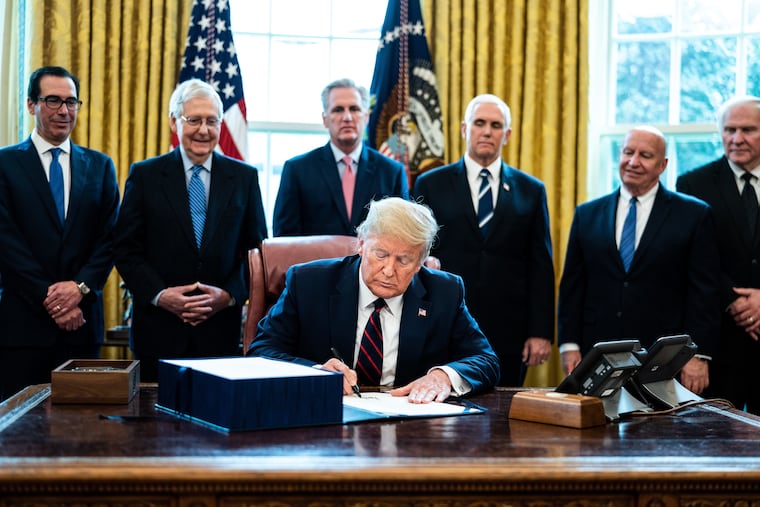Trump’s coronavirus response will protect Pennsylvania’s blue-collar workers | Opinion
Pennsylvania lawmakers are following the crucial federal stimulus with changes to unemployment and other steps to help workers during the coronavirus.

Since the COVID-19 outbreak first reached U.S. shores, the Trump administration has taken proactive steps to limit America’s exposure to the virus while working with Congress to give working families the financial support they need to weather the economic consequences of this global crisis.
While measures such as restricting travel from coronavirus hot spots and limiting nonessential activities are vital to protect the country, they also have direct economic consequences for working Americans. Businesses — including the small businesses that employ almost half the country’s private-sector workforce — can’t survive very long without a source of revenue. This problem is becoming increasingly widespread as states across the country, including Pennsylvania, have ordered nonessential establishments to close for at least several weeks.
The president’s authorization of direct cash payments to Americans, which will provide most working families with an invaluable financial buffer in these uncertain times, is about to take effect. I wholeheartedly support this proposal, which will give the typical family of four a vital $3,400 buffer. The federal government will also provide an additional $600 per week in unemployment compensation to help eligible workers laid off during this crisis up to July 31.
The unprecedented coronavirus relief bill will also provide hundreds of billions of dollars in low-interest loans to small businesses, ensuring that workers will have jobs to return to once it’s safe to leave home. Businesses that retain their workforce and rehire any employees who have been laid off won’t have to repay those loans — a powerful incentive for employers.
We need to get Pennsylvania back to where it was economically before the COVID-19 crisis. Pennsylvania had its lowest unemployment rate in decades, dipping to just 4.1% at one point during the last two years, just above our state’s historic low. Under President Donald Trump’s leadership, the country was seeing the best economy in our lifetime. Now, given the president’s stewardship, we can turn this around. Unlike the 2008 recession, which was caused by systemic policy disincentives to economic growth, this pandemic can be beaten through mitigation efforts, repurposing manufacturers to produce urgently needed products like ventilators, and moving forward with construction and other parts of the economy while adhering to Centers for Disease Controls and Prevention (CDC) guidelines.
Here in Pennsylvania, members of the General Assembly convened last week for a historic voting session. For the first time since 1682, members of our body could vote remotely in order to recognize social distancing while maintaining a functioning democracy. Along with Gov. Tom Wolf, the General Assembly enacted new laws last week in response to the COVID-19 pandemic.
To sync with the federal changes, we modified our unemployment compensation laws by suspending the one week waiting period before Pennsylvanians can collect benefits, as well as the job search requirement. We also provided employers with relief from charges for those employers who have had to furlough employees through no fault of their own. Further, we authorized the Pennsylvania Secretary of Labor and Industry to enact temporary regulations needed to access federal funds.
To do our part in providing necessary personal protective equipment for our frontline health-care providers, we appropriated $50 million to purchase medical supplies and equipment. In addition, we have been working to identify both available supplies of personal protective equipment and manufacturers in Pennsylvania who can retool their assembly lines to produce personal protective equipment.
We are also urging the governor to allow construction sites to open again. I am introducing HB 2400 to allow public and private construction activities that can adhere to social distancing practices and other mitigation measures defined by the CDC to protect workers. Highway and other open-air infrastructure projects, for instance, could easily be completed without requiring workers to come within six feet of each other. On March 19, Pennsylvania became the first state to shut down all active public and private construction sites, while issuing selective waivers on an ad hoc basis. There is no consistency.
Pennsylvanians should be assured that their elected officials at all levels, from President Trump to the Pennsylvania General Assembly, are working to provide the necessary tools to combat COVID-19 together and turn the economy back into the robust engine it was.
Mike Turzai is the speaker of Pennsylvania’s House of Representatives.